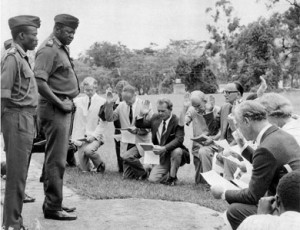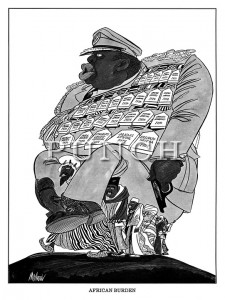
“His Excellency, President for Life, Field Marshal Al Hadji Doctor Idi Amin Dada, VC, DSO, MC, Lord of All the Beasts of the Earth and Fishes of the Seas and Conqueror of the British Empire in Africa in General and Uganda in Particular.”
– Self title
In 1971, General Idi Amin elected himself as President after over throwing the first established government of the nation under Milton Obote, post independence. He ruled as Commander in Chief for 8 long years. During that period of time, Idi Amin went on a rampage, killing over 300,000 Ugandans.
Obote was a well respected Ugandan politician but didn’t meet the Western standard in regards to English-Ugandan relations. He desired his country to be as liberated as possible, after all, that was aim of the fight for independence.
Let’s back track a little…
Interestingly, Amin was inducted into Britain’s Colonial African Troops, “KAR” at a young age with no significant educational experience. This military organization in question was a multi-battalion regiment, carried on by the British during colonial times, extending over most of East Africa.
As he was ascending through the ranks, he became infamous for his brutality and torture. From ordinary soldier, Amin excelled to an “effendi”, the highest position achievable for an African soldier within the British army.
Once President, Idi Amin terrorized the entire nation of Uganda as England turned a blind eye.
One question I cannot help but ask myself: is it by pure chance, that the English bred one of the most ferocious dictators in the History of Africa, immediately after their Independence, at such a crucial, vulnerable and premature time period?

In recently declassified documents from England’s Colonial era, many of their atrocities lead and influenced globally, including Asia and East Africa, were revealed.
According to Sky News, a very reputable English TV channel, they quoted these British documents stating “Amin was reliable”.
Eleven days before the Coup against Obote’s government, Richard Slater, British High Commissioner in Kampala stated many issues the new regime caused the British, qualifying the Anglo-Ugandan relations as “deplorable”. What issues you may ask?
- Obote’s new legislation gave all ownership of the import and export business to the Ugandan government.
- 60% of the shares of oil companies, manufacturing industries, banks, insurance companies and others would be nationalized.
Normal right? Considering, Uganda was an INDEPENDANT country. But no, this was greatly challenging the British business interests in Uganda.
Moreover ‘there is a danger that other countries will be tempted to try and get away with similar measures with more damaging consequences for British investment and trade’. Three weeks after Uganda proceeded with all these new legislations, Sudan decided to nationalize foreign businesses in a “ even more unacceptable way”

Amin being a simple marionette, unconsciously by his “allies”, he plummeted the country’s economy, racked up over 200 million dollars in debt, raised inflation to 20%, destroyed families, established poverty and unemployment but moreover mentally emotionally and physically scared an entire nation.
According to the British High commissioner , Ambassador Harold Smedley, Amin was ‘corrupt and unintelligent’ fully aware of his savagery but yet “despite his limitations Amin has considerable dignity and more the air of a leader than Obote.”
We’ve all seen Amin’s cruelty in class, dismembering his own spouse, using government officials heads as trophies. Now, is that the new definition of “dignity”?
Coming from a family of Ambassadors myself, the thought alone of someone of such stature conveying these thoughts is very frightening because this mindset itself can go a long way. And as we’ve learned, it did. It was only during the last few years when Idi Amin’s craziness made him turn against the English that they in return decided to stop any funding and ended relations with the country.
We need to open pour eyes and carefully inspect such situations in order for it to not repeat itself. Nothing is really as it seems . A little food for thought.
” Nobody is as powerful as we make them out to be” – Alice Walker
http://www.biography.com/people/idi-amin-9183487
http://africanhistory.about.com/od/biography/a/bio_amin.htm
http://www.nytimes.com/2003/08/17/world/idi-amin-murderous-and-erratic-ruler-of-uganda-in-the-70-s-dies-in-exile.
html://www.hartford-hwp.com/archives/36/502.html

3 responses to “The making of Idi Amin’s Regime”